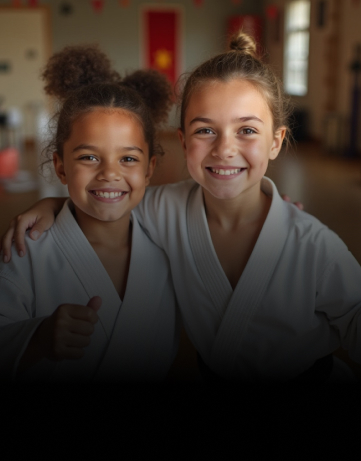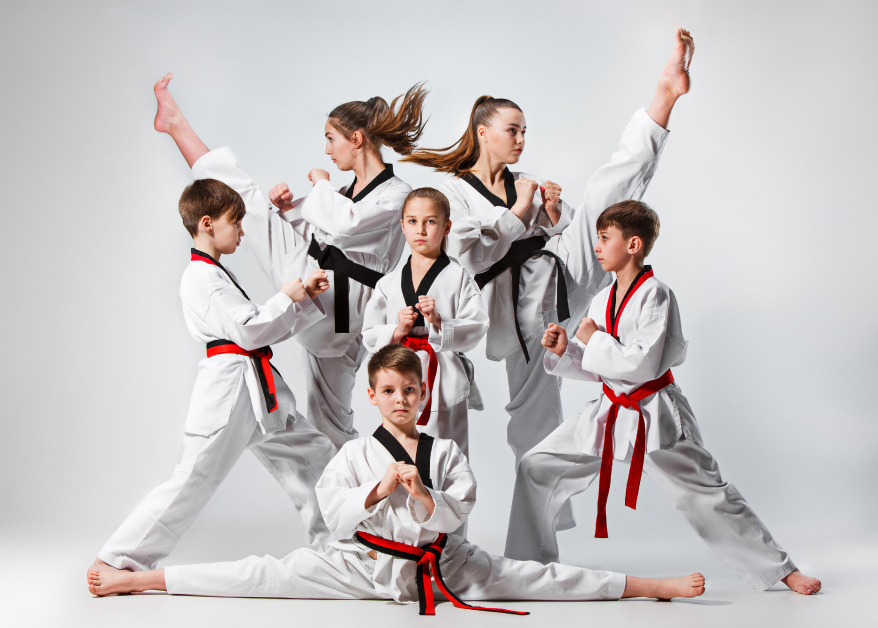Family Martial Arts – Classes that Bring Parents and Kids in Harmony
Family Martial Arts – Classes that Bring Parents and Kids in Harmony
Blog Article
Exactly How Karate for Children Can Increase Self-confidence and Discipline in Youthful Martial Artists
Karate for kids offers a special possibility to construct confidence and self-control in young martial artists. As they learn new strategies and face obstacles, they not just gain abilities yet also develop a strong sense of self-worth. This organized environment urges them to respect the journey of improvement. How does this training convert into their day-to-day lives? Discover the much deeper links that make karate greater than just a sport.
The Value of Confidence in Childhood Years Growth
Confidence is a necessary foundation in childhood years development. When you support your youngster's self-worth, you encourage them to face difficulties, take dangers, and express themselves openly. Children with confidence are more happy to check out brand-new activities and social scenarios, which can cause lasting friendships and beneficial experiences.Encouraging your kid to step out of their comfort area promotes resilience. They learn that failing isn't completion yet rather a tipping rock to success. By celebrating their achievements, no issue just how small, you help them recognize their capacities and worth.In this trip, support and positive reinforcement from you play an important role. Whether it's through appreciation or simply being present, your participation increases their self-confidence. As they expand, this confidence becomes a long-lasting possession, furnishing them to navigate both difficulties and possibilities with a solid sense of self.
Exactly How Martial Arts Educates Discipline and Emphasis
Karate aids you construct self-control and focus via its structured training regimen. As you practice mindfulness throughout each session, you'll find out to concentrate far better both on and off the mat. Plus, setting and attaining objectives in martial arts enhances your ability to stay attentive and committed.
Structured Training Program
While you take part in karate training, you'll rapidly uncover just how an organized program imparts self-control and emphasis in young practitioners. Each course complies with a particular format, including warm-ups, method method, and sparring. This uniformity educates you to devote and value the procedure to enhancement. As you learn strategies and kinds, you establish a sense of obligation for your own progress.The structured environment urges you to set objectives, whether grasping a brand-new belt or perfecting a kata. You'll find that staying focused throughout drills and courses develops your concentration. The discipline you cultivate in martial arts prolongs past the dojo, favorably influencing your schoolwork and day-to-day routines. Each session strengthens the significance of commitment, helping you become a more disciplined individual.
Mindfulness in Practice
As you exercise martial arts, you'll find that mindfulness becomes a crucial part of your training. Each step needs your complete interest, assisting you remain focused on the present moment. You'll discover to tune out interruptions and focus on your breathing, activities, and intents. This heightened understanding hones your reflexes and boosts your discipline.During sparring or types, you'll discover the value of being mentally existing - Karate Salisbury MD. You'll see how this emphasis not only enhances your strategy but likewise constructs your self-confidence. By exercising mindfulness in martial arts, you cultivate persistence and resilience, necessary traits that expand past the dojo. By doing this, karate teaches you to harness your mind, aiding you develop a regimented strategy to challenges both on and off the mat

Personal Goal Setting Techniques
Setting goals in martial arts isn't just about gaining belts; it's an effective way to cultivate technique and emphasis. When you set particular, attainable targets, you create a roadmap for your progression. As an example, rather of simply intending to boost your kicks, attempt concentrating on grasping a specific strategy each month. This method keeps you inspired and engaged.Breaking down larger objectives right into smaller sized, convenient steps aids you track your development and commemorate tiny victories in the process. Whether it's developing your position or increasing your sparring endurance, every objective strengthens your dedication. As you achieve these objectives, you'll build confidence in your skills and establish a solid feeling of self-control that prolongs beyond the dojo into daily life.
Building Strength With Martial Arts
Fighting style, specifically karate, supplies youngsters an unique possibility to build durability in a supportive setting. In classes, they face challenges that push their restrictions, whether it's understanding a new method or sparring with a companion. Each problem, like a missed kick or a lost suit, becomes an opportunity to discover and grow.As they exercise, youngsters find out to embrace discomfort and keep trying, also when points obtain difficult. They find that failure isn't completion; it belongs to the journey. This state of mind helps them bounce back stronger, not just in the dojo, but in day-to-day life.With each challenge they overcome, your child constructs confidence in their ability to take on challenges, sustaining their decision. Through martial arts, they'll recognize that strength isn't nearly physical stamina; it's about psychological grit and willpower, empowering them to deal with whatever life tosses their method.
The Duty of Regard in Martial Arts Training
Respect is a fundamental principle in karate training, fostering a culture of self-control and camaraderie amongst pupils. When you step onto the dojo floor, you're not simply discovering techniques; you're also finding out to respect your trainers, peers, and the art itself (Karate Salisbury MD). Bowing at the beginning and end of course isn't simply a formality; it signifies your acknowledgment of others' dedication.as and initiatives you develop mutual regard, you'll discover it improves your learning experience. You'll listen much more diligently to your teacher and gain understandings from fellow trainees. This setting motivates positive objection and assistance, enabling everyone to grow together.Moreover, regard grows self-control. Acknowledging the worth of tough job and humility helps you remain concentrated on your training. In turn, this regard translates right into your day-to-day life, improving your communications and connections outside the dojo. With karate, you find out that respect is crucial for individual development and community building
Achieving and setting objectives Success in Martial arts

Social Skills and Synergy in the Dojo
While training in the dojo, children naturally create necessary social skills and teamwork capacities. As they practice alongside peers, they discover to communicate effectively, share room, and assistance each other. Each class presents possibilities for partnership, whether it's during companion drills or team exercises. This teamwork cultivates friendships and creates a feeling of belonging, making the dojo a nurturing environment.Kids likewise acquire valuable problem resolution skills. When they encounter obstacles, such as differences during sparring, they find out to navigate these scenarios constructively. They exercise patience and compassion, comprehending that every person has various staminas and weaknesses.Moreover, participating in team activities grows a sense of liability. You'll see your kid finding out to depend on teammates and take obligation for their role in a group. These experiences not just sdsu football improve their fighting styles journey yet also outfit them with social tools they'll lug into various other locations of life.
The Long-Term Advantages of Martial Arts Beyond Childhood
As youngsters mature and shift into their adult years, the advantages of karate prolong much past the dojo. You'll find that the self-control and emphasis found out through karate can equate right into your scholastic and professional life. Establishing and achieving goals in martial arts cultivates a solid job ethic, which can push you to master any kind of endeavor.Moreover, the self-confidence gained from competing and grasping strategies can boost your self-esteem, helping you tackle difficulties head-on. This strength becomes indispensable as you encounter the unpredictabilities of adulthood.Additionally, the social skills developed through team effort and friendship in the dojo can cause far better partnerships in both individual and specialist balls. You'll discover to interact efficiently, resolve disputes, and develop an encouraging network.Ultimately, karate shapes not just competent martial artists, however all-round individuals prepared to handle the globe.
Regularly Asked Inquiries
What Age Is Ideal to Beginning Martial Arts for Children?
You can begin martial arts as very early as age 4 or 5, yet it usually relies on your child's maturation and passion. Discovering a class that fits their age and power level makes a big distinction.
Exist Any Kind Of Health And Wellness Advantages From Practicing Martial Arts?
Yes, practicing karate deals countless wellness advantages. You'll enhance your adaptability, strength, and control click to investigate while enhancing cardiovascular fitness. hockey tonight And also, it enhances focus and psychological wellness, making it a great selection for overall physical and psychological health.
Exactly How Often Should Youngsters Attend Martial Arts Courses?
You ought to urge your kids to go to karate courses at the very least 2 to 3 times a week. Consistency aids them learn methods properly and develop abilities, making their experience extra enjoyable and satisfying in the lengthy run.
Can Karate Aid With Handling Anxiousness in Children?
Yes, karate can assist take care of anxiety in children. It shows emphasis and self-control while offering a risk-free electrical outlet for power. You'll notice your child growing a lot more certain and tranquil as they practice on a regular basis.
What Equipment Is Required for Kids Starting Karate?

Report this page